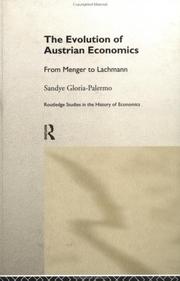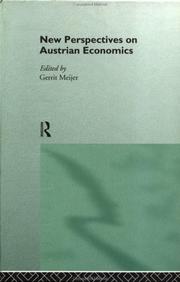| Listing 1 - 10 of 71 | << page >> |
Sort by
|
Book
ISBN: 9780669026986 0669026980 Year: 1979 Publisher: Lexington: Lexington books,
Abstract | Keywords | Export | Availability | Bookmark
 Loading...
Loading...Choose an application
- Reference Manager
- EndNote
- RefWorks (Direct export to RefWorks)

ISBN: 9780415195003 0415195004 Year: 1999 Publisher: London: Routledge,
Abstract | Keywords | Export | Availability | Bookmark
 Loading...
Loading...Choose an application
- Reference Manager
- EndNote
- RefWorks (Direct export to RefWorks)
Book
Abstract | Keywords | Export | Availability | Bookmark
 Loading...
Loading...Choose an application
- Reference Manager
- EndNote
- RefWorks (Direct export to RefWorks)
Book
ISBN: 1108582184 1108696015 110875273X 1108735886 Year: 2019 Publisher: Cambridge : Cambridge University Press,
Abstract | Keywords | Export | Availability | Bookmark
 Loading...
Loading...Choose an application
- Reference Manager
- EndNote
- RefWorks (Direct export to RefWorks)
This Element presents a new framework for Austrian capital theory, starting from the notion that capital is value. Capital is the value attributed by the valuer at any moment in time to the combination of production-goods and labor available for production. Capital is the result obtained by calculating the current value of a business-unit or business-project that employs resources over time. It is the result of a (subjective) entrepreneurial calculation process that relates the flow of consumptions goods to the value of the productive resources that will produce those consumptions goods. The entrepreneur is a ubiquitous calculating presence. In a review of the development of Austrian capital theory, by Carl Menger, Eugen von Böhm-Bawerk, Ludwig von Mises, Friedrich Hayek, Ludwig Lachmann as well as recent contributions, the Element incorporates the seminal contributions into the new framework in order to provide a more accessible perspective on Austrian capital theory.
Book
ISBN: 110876150X 1108708161 1108786154 Year: 2020 Publisher: Cambridge : Cambridge University Press,
Abstract | Keywords | Export | Availability | Bookmark
 Loading...
Loading...Choose an application
- Reference Manager
- EndNote
- RefWorks (Direct export to RefWorks)
We consider three important differences of Austrian approaches to economics compared to non-Austrian: focus on culture as meaning rather than as norms, beliefs, or attitudes; emphasis on culture as an interpretative lens rather than a tool of capital; and insistence that cultural analysis be a qualitative exercise rather than a quantitative one.
Book
ISBN: 3031085027 3031085019 Year: 2022 Publisher: Cham, Switzerland : Springer,
Abstract | Keywords | Export | Availability | Bookmark
 Loading...
Loading...Choose an application
- Reference Manager
- EndNote
- RefWorks (Direct export to RefWorks)
This book provides an overview of the evolution and theories of the Austrian School of Economics and develops answers to current economic questions and the pressing problems of the 21st century from the Austrian perspective. Readers will learn about the fundamental ideas of the Austrian School, the current state of Austrian economics, and the intellectual figures and institutions that sustain it as a vibrant intellectual movement. International experts on Austrian economics cover topics such as the economic impact of pandemics, trade blocs, federalism and European integration, and the economic development of China. The book also discusses the influence of the Austrian School on modern economic thought and mainstream economics, as well as on policymakers. It will appeal to students and scholars of economics and to anyone interested in social and economic liberalism.

ISBN: 041512283X 113800684X 9786611189976 113480623X 1281189979 0203030206 9780415122832 9780203030202 9781134806232 9781134806188 1134806183 9781134806225 1134806221 9781138006843 9781281189974 6611189971 Year: 1995 Publisher: London New York Routledge
Abstract | Keywords | Export | Availability | Bookmark
 Loading...
Loading...Choose an application
- Reference Manager
- EndNote
- RefWorks (Direct export to RefWorks)
In recent years there has been a spectacular revival of interest in the economics of the Austrian school.New Perspectives on Austrian Economics includes*A keynote chapter by Israel Kirzner on the question of subjectivism within Austrian Economics*Chapters on Menger, Hayek and Schumpeter*the Socialist Calculation debate*Austrian perspectives on key theoretical issues including Uncertainty and Business Cycle Theory*the policy implications of Austrian economics
Book
ISBN: 1316540340 1316540774 1316543358 1316411168 1316541207 1316541630 1107126401 1107565669 1316537765 9781316543351 9781316542927 1316542920 9781107126404 9781316541630 Year: 2016 Publisher: New York, NY
Abstract | Keywords | Export | Availability | Bookmark
 Loading...
Loading...Choose an application
- Reference Manager
- EndNote
- RefWorks (Direct export to RefWorks)
This book argues that the work of the Austrian economists, including Carl Menger, Joseph Schumpeter, Ludwig von Mises and Friedrich Hayek, has been too narrowly interpreted. Through a study of Viennese politics and culture, it demonstrates that the project they were engaged in was much broader: the study and defense of a liberal civilization. Erwin Dekker shows the importance of the civilization in their work and how they conceptualized their own responsibilities toward that civilization, which was attacked left and right during the interwar period. Dekker argues that what differentiates their position is that they thought of themselves primarily as students of that civilization rather than as social scientists, or engineers. This unique focus and approach is related to the Viennese setting of the circles, which constitute the heart of Viennese intellectual life in the interwar period.
Austrian school of economics. --- Economics --- Economic theory --- Political economy --- Social sciences --- Economic man --- Austrian school of economists --- Marginalist school of economics --- Schools of economics --- Marginal utility --- History.
Book
ISBN: 1108668879 1108601081 1108587526 1108724035 Year: 2020 Publisher: Cambridge : Cambridge University Press,
Abstract | Keywords | Export | Availability | Bookmark
 Loading...
Loading...Choose an application
- Reference Manager
- EndNote
- RefWorks (Direct export to RefWorks)
This Element surveys the field of defense, peace, and war economics with particular emphasis on the contributions made by Austrian economists. I first review treatments of defense, peace, and war by the classical economists. I then discuss the rise of a distinct and systematic defense, peace, and war economics field of study starting in the 1960s. Next, I consider the contributions by Austrian economists to the field. This includes the economic analysis of the nature of the war economy, problems with the public good justification for the state provision of defense, the seen and unseen costs of war, the idea of the liberal peace, and the realities and limitations of foreign intervention. I conclude with a discussion of some open areas for future research.
War --- Austrian school of economics. --- Austrian school of economists --- Marginalist school of economics --- Schools of economics --- Marginal utility --- Economics of war --- Competition, International --- War, Cost of --- Economic aspects.
Book
ISBN: 1788211766 1911116681 9781911116684 1911116665 1911116673 9781911116660 9781911116677 9781788211765 Year: 2018 Publisher: Newcastle upon Tyne Agenda Publishing
Abstract | Keywords | Export | Availability | Bookmark
 Loading...
Loading...Choose an application
- Reference Manager
- EndNote
- RefWorks (Direct export to RefWorks)
The notion of marginalism is central to modern economic theory. Its emergence, in the 1870s, underpinned the change from classical economics to modern (micro)economics, described by Schumpeter as a 'revolution'. This book explores the origins of the concept, its development and role in modern economics and shows why the marginalist approach is much more than a set of mathematical rules.
The book examines how marginalism and its development of calculus came about in a variety of different arenas, including as a reaction to Ricardo's dominant theory of rents, in von Thunen's location model, in the writings of German and French authors, both within the mainstream and outside it, before going on to look in detail at the work of Jevons, Walras and Menger, the economists most closely associated with the marginal revolution.
By exploring the origins and development of the marginalist approach within the history of economic thought, rather than seeking to explain it in forbidding formal terms, the book is better able to show students the wider importance of the marginalist approach in economic theory and its far-reaching societal implications in terms of the distribution of wages and capital. For anyone who has struggled with the technicalities of microeconomic theory, this approach will be warmly welcomed.
Austrian school of economics. --- Economics --- Austrian school of economists --- Marginalist school of economics --- Schools of economics --- Marginal utility --- History. --- Austrian school of economics
| Listing 1 - 10 of 71 | << page >> |
Sort by
|

 Search
Search Feedback
Feedback About UniCat
About UniCat  Help
Help News
News